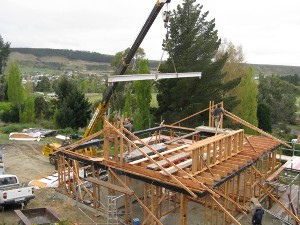ANZ’s latest Property Focus says there simply isn’t enough economic resource available for residential construction to grow much more, and any light at the end of the migration and building materials tunnel seems months away. By then, demand will likely feel different.
ANZ chief economist Sharon Zollner says while the bank’s forecast is for the overall level of residential construction to remain high by historical standards, there is a period of contraction on the cards.
“We have penciled in about a 6% contraction in residential investment activity over next year, which relative to previous cycles can be thought of as a soft landing.
“However, while benign, this is a significantly weaker forecast than the RBNZ’s May Monetary Policy Statement (MPS), and one of the reasons why the OCR will top out at just 3.5% opposed to the near-4% signaled by the RBNZ, and the over 4% peak currently priced in by the market.”
The RBNZ is looking to engineer a soft landing and dampen the inflation fire down before it truly gets out of hand, and the housing market and the residential construction sector will be a big part of how that’s achieved.
Zollner says the bank suspects it’ll happen a bit quicker than the RBNZ expects, but it’s just a question of timing.
“The RBNZ is will keep going until house prices fall more and construction cools significantly, as it’s a key part of getting on top of the broader inflation problem. It’s a question of when, not if.”
Contributing to economy
Residential construction accounted for about 6.5% of real expenditure GDP in the year to March, and a little less than that in the production measure of GDP.
Factor in sky-high building cost inflation, and residential investment has shot up to almost 9% of the economy.
Residential investment is an area of the economy that tends to experience relatively outsized swings through the business cycle. When residential investment gets going, it really gets going, and when it stops it can be just as dramatic, says Zollner.
“Swings in residential construction, and the housing cycle more broadly, tend to also be associated with swings in prices.”
Home ownership (i.e. the cost of building a house excluding land) accounts for about 9% of the Consumers Price Index (CPI). Add rents to that and it’s at almost 20% of the CPI basket.
Where the housing market goes, housing and household utilities CPI inflation tends to follow. Of the 6.9% year-on-year increase in CPI inflation in the first quarter of this year, home ownership - up 18.3% year-on-year – contributed 1.6% points.
Clearly, housing and residential investment can have a lot to say about the broader direction for economic momentum and inflation. Zollner says that begs the question, where to from here, now that interest rates are rising and house prices are falling?
Industry pulse
Residential construction intentions are one of the more worrying signals for the industry pulse right now, clearly showing that firms are expecting a slowdown – potentially a sharp one.
While the construction sector respondents’ expectations for their own activity is holding up relatively higher, it’s still in contractionary territory. Zollner says that suggests housing consents will continue to trend lower over coming months.
“However, while these data provide a decent steer on housing consents, they haven’t provided a good signal on still-strong multi-unit dwelling consents.”
She says one important point is New Zealand’s housing deficit is on the edge of tipping into surplus. “An improved housing supply- demand balance is expected to take the pressure off house price inflation over the medium term. More than that, it suggests that fundamental demand for housing (and therefore residential construction), could also have a different vibe to it compared to the past decade or so.
Migration- driven population changes could have a lot to say in the housing supply vs demand space over the medium term. “Should there be a net outflow, we could very well be concluding this time next year that New Zealand has an oversupply of houses. That’s something the housing market Zollner says, however, New Zealand isn’t just one big housing market, but it’s sure felt like it the last couple of years.




 Search
Search
